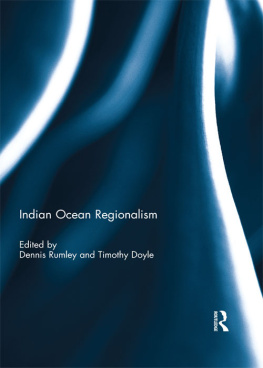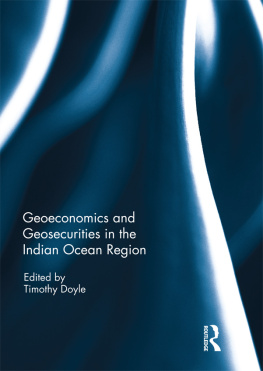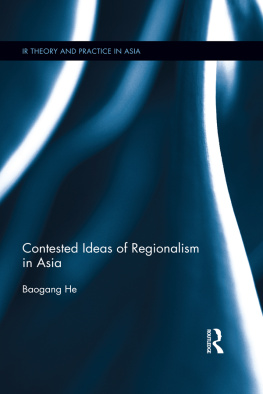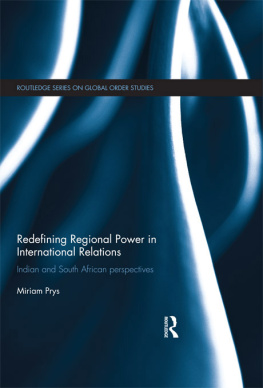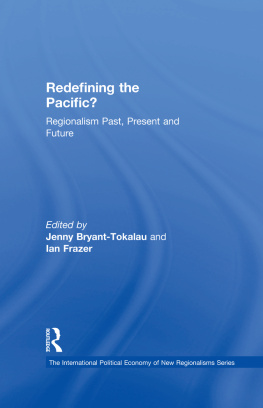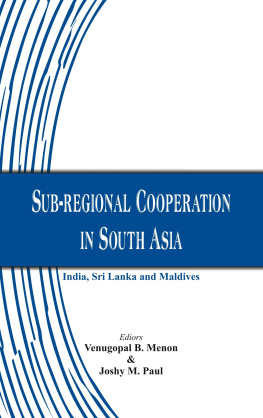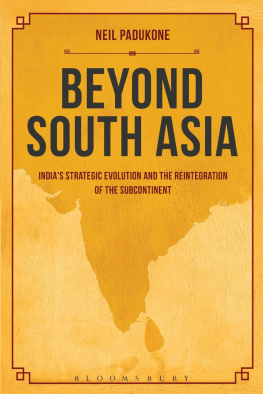Indian Ocean Regionalism
Pan-regional constructions in the Indian Ocean are of relatively recent origin, are contested and remain relatively weak at present. Sub-regional constructions, on the other hand, have tended to be more focussed, especially in terms of security, and have generally been more successful.
The principal purpose of this volume is to critically evaluate the debates surrounding these issues and to elucidate some of the main strengths and weaknesses of regionalism at both scales. The discussion begins at the pan-regional scale with an evaluation of pan-regional contestation, followed up by a chapter on the main pan-regional grouping Indian Ocean Region-Association for Regional Cooperation (IOR-ARC) which was renamed Indian Ocean Rim Association (IORA) in 2013. Thereafter, key examples of sub-regional groupings South Asia, ASEAN, SADC and GCC are critically discussed in turn.
The principal readership for this volume will be: students and scholars of geography, politics and international relations; students of Indian Ocean studies; regionalism experts; bureaucrats and politicians both within and outside the Indian Ocean Region who wish to gain insights into Indian Ocean matters; scholars who appreciate a view of regional relations from the inside.
This book was originally published as a special issue of the Journal of the Indian Ocean Region.
Dennis Rumley is Professor of Indian Ocean Studies, Curtin University, Western Australia. Professor Rumley is Chair of the Indian Ocean Research Group (IORG), which is an Observer to the Indian Ocean Rim Association (IORA). He is Founding Editor of the Journal of the Indian Ocean Region.
Timothy Doyle is Professor of Indian Ocean Futures, Curtin University, Western Australia. Professor Doyle is Australias Focal Point on the Academic Group of the Indian Ocean Rim Association (IORA) and current Chair of the Indian Ocean Rim Academic Associates Academic Group (IORAG). He also serves as Chair and Co-Director of the Indo-Pacific Governance Research Centre at the University of Adelaide; and is Chair of Politics and International Relations at Keele University in the United Kingdom. He is Chief Editor of the Journal of the Indian Ocean Region.
Indian Ocean Regionalism
Edited by
Dennis Rumley and Timothy Doyle
First published 2015
by Routledge
2 Park Square, Milton Park, Abingdon, Oxon, OX14 4RN, UK
and by Routledge
711 Third Avenue, New York, NY 10017, USA
Routledge is an imprint of the Taylor & Francis Group, an informa business
2015 The Indian Ocean Research Group
All rights reserved. No part of this book may be reprinted or reproduced or utilised in any form or by any electronic, mechanical, or other means, now known or hereafter invented, including photocopying and recording, or in any information storage or retrieval system, without permission in writing from the publishers.
Trademark notice: Product or corporate names may be trademarks or registered trademarks, and are used only for identification and explanation without intent to infringe.
British Library Cataloguing in Publication Data
A catalogue record for this book is available from the British Library
ISBN 13: 978-1-138-82141-5
ePub eISBN 13: 978-1-317-58596-1
Mobipocket/Kindle eISBN 13: 978-1-317-58595-4
Typeset in Times New Roman
by RefineCatch Limited, Bungay, Suffolk
Publishers Note
The publisher accepts responsibility for any inconsistencies that may have arisen during the conversion of this book from journal articles to book chapters, namely the possible inclusion of journal terminology.
Disclaimer
Every effort has been made to contact copyright holders for their permission to reprint material in this book. The publishers would be grateful to hear from any copyright holder who is not here acknowledged and will undertake to rectify any errors or omissions in future editions of this book.
Contents
Dennis Rumley, Timothy Doyle and Sanjay Chaturvedi
G.V.C. Naidu
P.V. Rao
Shaun Lin and Carl Grundy-Warr
Francis A. Kornegay Jr
A.K. Pasha
The chapters in this book were originally published in the Journal of the Indian Ocean Region, volume 8, issue 1 (June 2012). When citing this material, please use the original page numbering for each article, as follows:
Chapter 1
Securing the Indian Ocean? Competing regional security constructions
Dennis Rumley, Timothy Doyle and Sanjay Chaturvedi
Journal of the Indian Ocean Region, volume 8, issue 1 (June 2012) pp. 120
Chapter 2
Prospects for IOR-ARC regionalism: an Indian perspective
G.V.C. Naidu
Journal of the Indian Ocean Region, volume 8, issue 1 (June 2012) pp. 2136
Chapter 3
South Asias retarded regionalism
P.V. Rao
Journal of the Indian Ocean Region, volume 8, issue 1 (June 2012) pp. 3753
Chapter 4
ASEAN and interconnecting regional spheres: lessons for the Indian Ocean Region
Shaun Lin and Carl Grundy-Warr
Journal of the Indian Ocean Region, volume 8, issue 1 (June 2012) pp. 5470
Chapter 5
South Africa and SADC in the Indian Ocean maritime security equation
Francis A. Kornegay Jr
Journal of the Indian Ocean Region, volume 8, issue 1 (June 2012) pp. 7189
Chapter 6
The Gulf Cooperation Council: a regional approach to peace, security and development
A.K. Pasha
Journal of the Indian Ocean Region, volume 8, issue 1 (June 2012) pp. 9098
Please direct any queries you may have about the citations to clsuk.permissions@cengage.com
This book draws upon the research of a much larger three-year project entitled Building an Indian Ocean Region [DP120101166], which is funded by the Australian Research Council (ARC) Discovery Projects Scheme for funding 20122015.
Chief Editor
Timothy DoyleUniversity of Adelaide, Australia; Curtin University, Australia; and Keele University, UK
Dennis RumleyFounding Chief Editor, Curtin University, Australia
Sanjay ChaturvediPanjab University, India
P.V. RaoOsmania University, India
Associate Editors
Christian BouchardLaurentian University, Canada
Priya ChackoUniversity of Adelaide, Australia
Vijay SakhujaNational Maritime Foundation, India
Clive SchofieldUniversity of Wollongong, Australia
Commissioning Editor
Adela AlfonsiUniversity of Adelaide, Australia
International Board Members
Kasen Hj. Abu BakarUniversiti Kebangsaan, Malaysia
Nasser Al-MawaliQaboos University, Oman
Mohd Nizam BasironMaritime Institute of Malaysia, Malaysia
Sam BatemanUniversity of Wollongong, Australia
Vivian ForbesUniversity of Western Australia, Australia
Blent GkayKeele University, UK
Carl Grundy-WarrNational University of Singapore, Singapore

